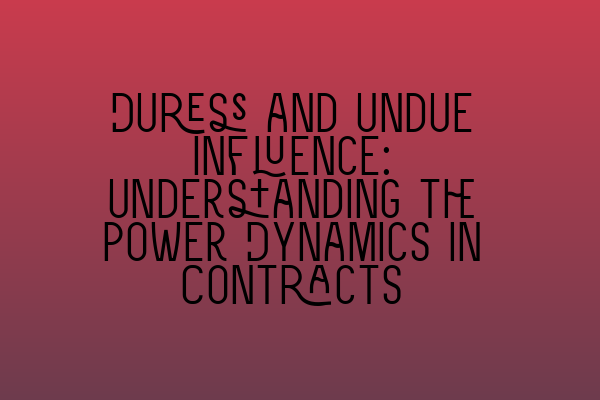Duress and Undue Influence: Understanding the Power Dynamics in Contracts
Introduction:
Contracts play a vital role in business and personal relationships, providing a framework for legal obligations and enforceable agreements. However, not all contracts are entered into freely and voluntarily. In some cases, one party may exert undue influence or coerce the other party into entering into a contract against their will. This raises important questions about the validity and fairness of the contract. In this article, we will explore the concepts of duress and undue influence, and delve into the power dynamics that can undermine the formation of a valid contract.
What is Duress?
Duress occurs when one party enters into a contract as a result of threats, violence, or psychological pressure exerted by the other party. The victim of duress is effectively left with no meaningful choice but to consent to the contract. Common examples of duress include physical violence, blackmail, or even threats of harm to one’s family or reputation.
Understanding the Impact of Duress in Contracts:
When duress is present, the contract is generally considered voidable. This means that the victim of duress has the option to invalidate the contract and seek legal remedies. However, it is important to note that duress must be proven in court, and the burden of proof lies with the party alleging the duress.
Unpacking Undue Influence:
Undue influence is a concept that goes beyond mere pressure or coercion. It occurs when one party takes advantage of a position of power or trust to manipulate the other party into entering into a contract. The key difference between duress and undue influence is that in the latter, there may not be explicit threats or violence. Instead, the influencing party may use subtle tactics like manipulation, deceit, or exploiting a vulnerable position.
The Power Dynamics in Contractual Relationships:
Power dynamics play a crucial role in understanding the presence of duress and undue influence in contracts. In many cases, the influencing party holds a position of superiority, such as being older, more experienced, or economically stronger than the other party. This power imbalance can make it difficult for the victim to freely negotiate or reject the terms of the contract.
Furthermore, power imbalances can often be found in relationships where trust or fiduciary duties are involved. For example, a doctor exploiting the vulnerability of a patient or a financial advisor misleading a client to secure their own gain. In these situations, the victim may rely heavily on the advice or expertise of the influencing party, making it challenging to assert their own interests.
Challenging Contracts Based on Duress and Undue Influence:
If a contract is suspected to have been entered into under duress or undue influence, the victim can take legal action to challenge its validity. This typically involves proving that the influencing party exerted pressure, exploited a position of power, or manipulated the victim into entering into the contract.
Conclusion:
Duress and undue influence can drastically affect the fairness and enforceability of contracts. It is essential for individuals and businesses to be aware of their rights and the potential abuse of power in contractual relationships. If you suspect a contract has been entered into under duress or undue influence, seek legal advice promptly to protect your interests and seek appropriate remedies.
Related Articles:
